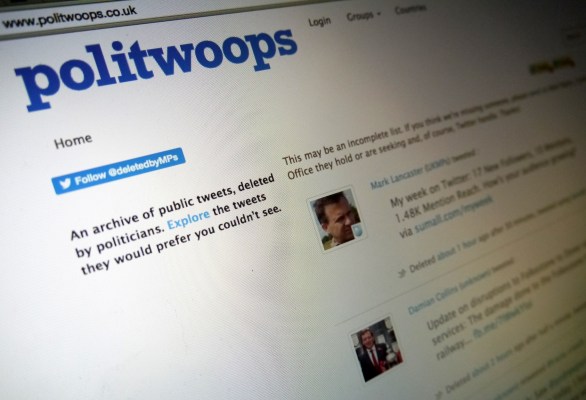Politicians in 25 countries will be shifting a little more uneasily on their benches this week as Politwoops, the service that tracks politicians’ deleted tweets, and can thus flag up attempts to edit previously expressed public opinions or cover up gaffes (as well as more mundane stuff like typos), has gone back online.
At the end of December Twitter confirmed it would be restoring Politwoops’ access to its API after discussions between the company and the various transparency organisations that work with the tool resulted in an agreement — reversing earlier blocks Twitter placed on the service last year. Politwoops is run by The Sunlight Foundation in the U.S., and by its creator, The Open State Foundation elsewhere.
As well as deleted tweets the tool tracks the time between when a tweet was tweeted and when it was deleted. Politwoops said it has also now added a search filter feature allowing deleted tweets to be filtered based on this time period to make it easier for users to filter tweets deleted because of a typo (which presumably tend to be deleted within seconds or minutes, rather than weeks or months), and thus zero in on more interesting examples of politicians self-editing.
While it’s once again tracking European Union politicians’ tweets, and elected representatives in EU countries such as the U.K., the service is still not yet back online in the U.S. A spokesman for The Open State Foundation told TechCrunch it would be back online “soon”, adding that it is “more a matter of days and weeks than months”.
Politwoops is not only being revived in 2016, after a five month hiatus, but also has plans for expanding the reach of the service. “We have ambition to expand to a lot of countries, and especially — for example — in Africa, Middle East, Latin America,” he said. “We have a bit covered, but not all of them. Eastern Europe. So there are more countries where we want to add, and that takes capacity — for which we are looking for support.”
The spokesman added that these expansion plans had been on hold for the past five months because of the uncertainty about whether Twitter would allow the service to survive.
“Now we are confident to we will also roll Politwoops out in more countries,” he added. “Five months ago, we didn’t know what to do — whether we should keep working on it or not. So we worked then to get an agreement with Twitter.
“After the Twitter developers conference we started having direct talks with Twitter… The discussions we had was more explaining how we were working, what we were doing, and explaining how Politwoops worked. Those were interesting talks. Basically more or less explaining how we worked, how we deal with some issues, how we make sure that [the accounts Politwoops tracks] are politicians.”
Twitter originally suspended the service for a violation of its developer agreement, saying at the time: “Honoring the expectation of user privacy for all accounts is a priority for us, whether the user is anonymous or a member of Congress.”
Politwoops’ spokesman pointed to the change of tone vis-a-vis developers in comments made by new(ish) Twitter CEO Jack Dorsey in October as the big positive development for its public accountability and transparency mission.
Dorsey made specific mention of Politwoops in those comments, telling developers: “We have a responsibility to communicate our roadmap in a clear and transparent way to everyone in this community. We have a responsibility to have an open dialogue with you to make sure we are serving you in the best way. We have a responsibility to continue to empower organizations that bring more transparency to public dialogue, such as Politwoops.
“We need to make sure we are serving all these organizations and developers in the best way, because that is what will make Twitter great. We need to listen, we need to learn, and we need to have this conversation with you. We want to start that today.”
Digital rights organisation, Access Now, which also works with Politwoops, notes that the agreement it has reached with Twitter expands the class of users whose deleted tweets can be tracked by Politwoops to also include public officials, not just elected representatives — so there’s more expansion on the cards for the service.
